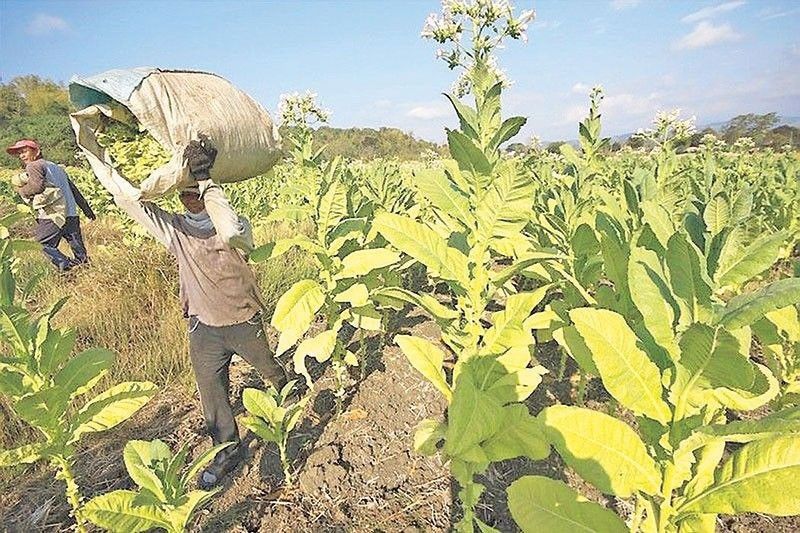Special Report: Tobacco farmers pin hopes on 60-year-old fund

(Second of a series)
MANILA, Philippines — Many tobacco farmers stay in the industry for several reasons, all of which revolve around assurance.
First, tobacco is the lone commodity in the country that has a floor price or a guaranteed minimum selling price. Second, that floor price is reviewed and adjusted every two years.
Third, the industry receives state support year in and year out, particularly the excise taxes collected from cigarettes that are plowed back to the industry through the local government units (LGUs).
Tobacco has been an inter-generational crop, especially in Northern Luzon.
Take 50-year-old Bernard Vicente, for example. He is a third-generation tobacco farmer and currently the chairman of the National Federation of Tobacco Farmers Association and Cooperatives.
The guaranteed support encourages farmers to continue cultivating tobacco.
But just like other crops, problems surrounding tobacco worsened in recent years. If it had guaranteed support, it also had an assured enemy: health. The crop has been vilified since it is the primary raw material for the manufacture of cigarettes.
Vicente said that the release of the Tobacco Fund bodes well for the industry, particularly for farmers who do not get substantial support from their LGUs through the excise tax collections.
Aside from the Tobacco Fund, the government also earmarks a portion of the tobacco excise taxes collected from manufactured cigarettes for the development of the industry.
The collections are allocated to the tobacco farmers’ LGUs, which decide how to use the money pursuant to existing laws.
Vicente lamented that most of the projects funded by the tobacco excise taxes were not benefitting the industry directly.
The Tobacco Fund could be a better alternative since it is managed by a national government agency. The chances for misallocation are minimal, Vicente said.
“What we need is livelihood so that we can stand on our own. We are the reason why we have these funds,” he added.
“We might have a better future if the NTA (National Tobacco Administration) would get the Tobacco Fund and be the one to implement projects for the industry since it would have minimal political interventions,” Vicente said.
A tobacco farmer earns a profit of about P130,000 for every hectare, which would mean a salary of about P20,000 for the six months he cultivates the crop, Vicente said. “But the average landholding of farmers is just half a hectare. So, we just earn half of that.”
Yearning for change
Some of the livelihood programs that tobacco farmers seek are those that could provide them additional sources of income like livestock, cattle and poultry raising. Farmers are cognizant that they won’t survive on tobacco alone.
That is why most of them plant corn or rice in the months of June until August, after tobacco season is done and when the environment is not conducive for the crop’s cultivation.
This is what the NTA envisions in its STEP-UP plan or its blueprint for the industry--uplifting tobacco farmers by making them go beyond the crop. Under the plan, the government wants to hike local tobacco production by transforming small-scale farming into a larger commercial food system.
The plan revolves around five priority areas: boosting local production, reducing production cost, ensuring availability of safe and nutritious food, raising farmers’ income and modernizing agriculture.
These are all aligned with the current administration’s vision for the sector.
The country’s tobacco output fell to 42 million kilograms last year from a peak of nearly 80 million kg 13 years ago.
Previously, the NTA wanted to get at least P5 billion a year from the Tobacco Fund to finance STEP. Today, it is making smaller steps in the hopes of getting more assured additional funding.
The agency sought nearly P710 million in additional funding for some of its STEP-UP programs next year, but the DBM did not approve it.
“I think we have the capability to implement all these projects. Only limiting factor here is we lack manpower. But we will hire more people if we are given the budget,” said NTA deputy administrator Nestor Casela.
The NTA has also sought the help of President Marcos and his sister Sen. Imee Marcos to intervene for the release of higher Tobacco Fund allocation for the agency.
The agency has also rallied various mayors and governors of tobacco-producing provinces and regions to support the release of the fund. Farmers, like Vicente’s group, have signified their support as well through the issuance of resolutions.
No less than the Private Sector Advisory Council (PSAC) of President Marcos have urged the administration to release more of the Tobacco Fund.
Earlier this month, Agriculture Secretary Francisco Tiu Laurel disclosed that there is a proposal to expand the planted area of tobacco by 20,000 hectares by 2028.
“Tobacco clearly is a money-making industry. Farmers can earn in that industry,” Tiu Laurel said after the PSAC meeting with the Marcos on August 15.
“Get a portion of the taxes collected and increase the plantable areas by 5,000 hectares for four years. The fund can be used to buy machinery, seeds and fertilizer to grow tobacco,” he added.
Tobacco farmers are proposing that the use of the Tobacco Fund could be patterned after the rice competitiveness enhancement fund (RCEF), which has become a poster boy of sorts for earmarking money for the agriculture sector. But in doing so, legislation is necessary.
RCEF is a guaranteed annual fund that has been pre-allocated by the wisdom of the law – portions of it go to seeds, machinery, training and credit, among others.
In the past, there have been attempts to institutionalize STEP through a law to easily tap the Tobacco Fund, such as the bill of former Ilocos Sur Rep. Deogracias Victor Savellano, who is currently an agriculture undersecretary.
As the Tobacco Fund sits in the national coffers – increasing by at least P6 billion annually — tobacco farmers remain hopeful that someday it would be released to help them have a brighter future.
As for Vicente, the tobacco farmer, he hopes to see the day that his farm would become an agricultural tourism spot. He currently has a four-hectare land planted with fruit-bearing trees and other trees as well as a fish pond adjacent to his two-hectare tobacco farm.
“So, we will not be dependent on tobacco anymore. At least we will have an alternative option in the long run,” he said.
(To be concluded)
- Latest
- Trending


























